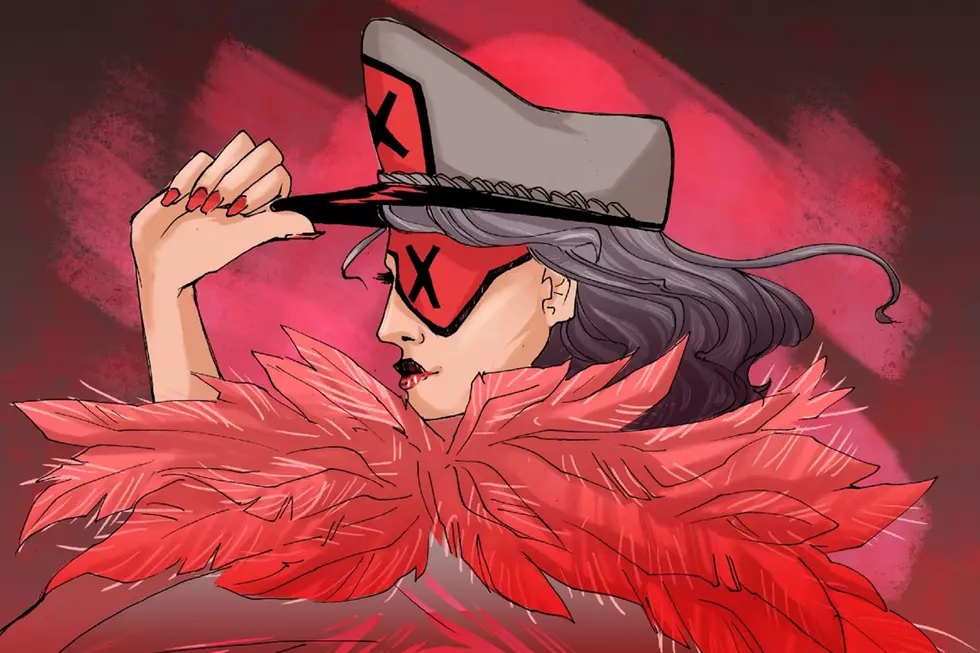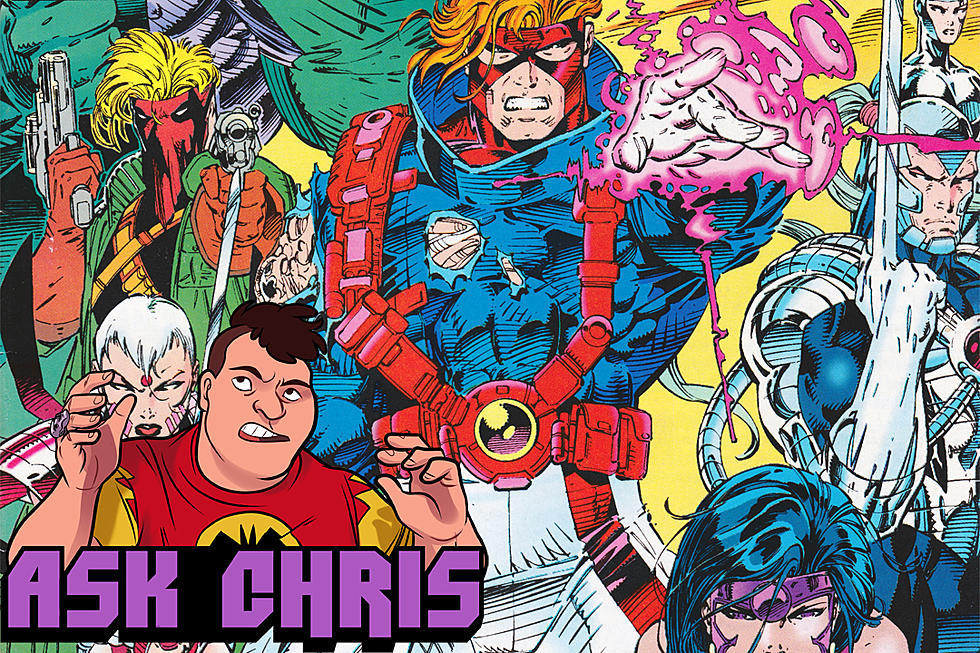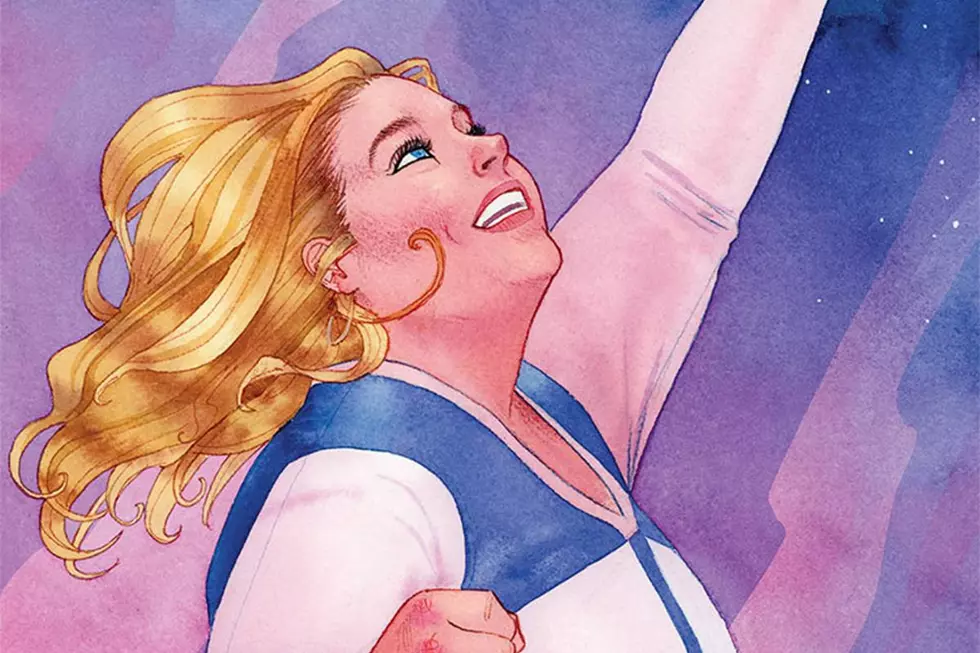![DC Comics Co-Publisher Jim Lee on Taking DC Digital [Interview]](http://townsquare.media/site/622/files/2010/06/jimlee-240.png?w=980&q=75)
DC Comics Co-Publisher Jim Lee on Taking DC Digital [Interview]
 The big DC Comics announcement about digital distribution is finally here, with comics by the publisher of Batman and Superman arriving on the iPad, iPhone, iTouch, and PlayStation network. The leap to digital distribution was due in no small part to the work of DC Co-Publisher and noted comics artist Jim Lee, who had spoken openly and often about his enthusiasm for digital comics after his promotion.
The big DC Comics announcement about digital distribution is finally here, with comics by the publisher of Batman and Superman arriving on the iPad, iPhone, iTouch, and PlayStation network. The leap to digital distribution was due in no small part to the work of DC Co-Publisher and noted comics artist Jim Lee, who had spoken openly and often about his enthusiasm for digital comics after his promotion.
ComicsAlliance had a chance to talk with Lee about the big news, what it will mean for fans, retailers, and the industry, the possibility of digital graphic novels and day and date releases, and the larger strategy behind it all.
ComicsAlliance: When the decision was made to expand into digital platforms like the iPad or the iPhone, how did you initially go about developing your digital strategy?
Jim Lee: There were several retailers that we brought into the discussion from almost day one, and we got their feedback on all the different component of our digital strategy. We feel good about the level of discussion, and we feel even better about the fact that we're going to meet with them regularly to figure out how to use the affiliate program to best serve their needs. We've already talked about a couple of different business strategies... We're awaiting more data from the initial sales release of our titles, and we expect to sit down with a key group of retailers and continue our ongoing discussion with them.
CA: The price for individual issues is going to range between 99 cents and 2.99, but what will be the typical digital price point for the equivalent of a $2.99 comic?
JL: The "default" will be the $1.99 that seems to have gotten some traction in the digital marketplace but we'll have it ranging from free all the way up to $2.99, for a variety of reasons. And that's after listening to and reading consumer feedback, and the way things sell at those price points will affect and inform our future decision-making in terms of pricing. And that's not just feedback from the fans, but also our traditional brick and mortal partners.
CA: In terms of pricing, will there be any digital versions of trades – bundled collections of digital comics that sell for less than their price as singles?
JL: Right now we're focusing on the periodical side of things, but obviously we have had many detailed discussions about graphic novels and how those are best served going forward in the digital space and we'll have announcements shortly as we get to them, but our initial release is focused on periodicals, and there's a reason for that. That's as much as I can say about it.

CA: You're planning to offer digital comics through the DC website itself later this year; will you continue to offer digital comics through Comixology after that happens?
JL: Yes. One of the elements of our strategy is some measure of conversion; if you buy something on the Comixology site or the app on your iPhone, or on DCComics.com or the DC Comics app on your iPad you'll be able to read them on all other places.
CA: One detail that jumped out was the inclusion of a creator incentive program in your digital plans; how exactly is that going to function for both creators of new and old material?
JL: One of the key components of our digital strategy is making sure that the talent who created these awesome stories that comprise our backlist are compensated fairly. It's calculated slightly differently, and not to get into specifics, but the amounts that will be paid are commensurate to our traditional royalty plan for comics in print. Basically, we want to make sure that the creative teams behind our books would be fairly compensated, even though this is a brand new channel, and we wanted to have that figured out before we announced.
CA: And this system will extend all the way through the back catalog as well as to new books?
JL: Correct.
CA: There's been a lot of concern recently about the issue of digital comics piracy; is that something that you plan to address as well?
JL: We've had some luck in shutting down a couple sites, and there was one recently that got a fair amount of press, but pirated comics definitely impact our business in a negative way and we have a day and date release strategy, and that's not purely because of piracy, but that's something that you have to take into account whenever you have that kind of piracy going on as soon as the books are being published. We definitely had discussions about the best way to handle it. It's a factor in any business where you see that kind of piracy.
 CA: Well, once people get the option to legally buy the digital comics content they want in a timely, convenient way, I think that's going to be very appealing, even to people who might consider downloading illegal scans.
CA: Well, once people get the option to legally buy the digital comics content they want in a timely, convenient way, I think that's going to be very appealing, even to people who might consider downloading illegal scans.
JL: I also think that part of the appeal isn't just offering the same thing; I think you have to offer something that's more elegant, that's easier to use, that fits into the rest of your library, that basically has a consistency of quality so that you know what you're getting.
CA: Do you see the day and date release of the "Justice: League Generation Lost" series as your pilot project for a broader day and date release of DC Comics content?
JL: It's a meaningful experiment. We have expectations of how our digital plan will perform and the kinds of information we'll glean from that, but you won't know until you're out there. I think our strategy is sounds in the way we've priced our database and the fact that we're leading with content [involving] well-known characters that will come out bi-weekly. I think we'll get a lot of meaningful feedback from not just the readers and consumers but the brick and mortar stores and how that's impacting them. I hope is that it's actually going to increase attention to ["Generation Lost"] with the amount of marketing and press we're giving it, and that this will be helpful in creating interest and excitement about the title, and that is part of our strategy. As we roll out our strategy it's definitely going to be informed by the sales trends that we see. And that's part of the attraction of this channel; we get almost immediate feedback and we can fine-tune our upcoming releases based on that feedback we're getting from consumers.
CA: In terms of how the digital channel will affect print sales, are you hoping that digital distribution will reach and attract new readers through the single or periodical content, and then move them into brick and mortar stores for hardcovers and trade paperbacks?
JL: The great thing about this is that there's a number of ways you can use the digital marketplace to enhance and promote the traditional brick and mortar stores. For example, we're doing a downloadable preview of the first 10 pages of "Superman" #700 by [J. Michael Straczynski], and that will be offered for free, and then they can go to their local comic shop to buy the comic if they're interested in it. If you look at our offerings we have a lot of books that are tied to video game deals that we've licensed, to kids comics... We feel that we're going to get a lot of consumers that are kids and people who will be coming across comic book content for the first time because they've seen it in movies or cartoons or video games. We're also going to get a lot of relapsed fans that have strayed away from the hobby and come back because they're seeing some of the classic library presented in digital form for the first time, and it's convenient for them to access it and download it. So I think you're going to see new consumers, but they're going to be very different.
CA: As a creator yourself, do you think that an influx of new consumers through the digital channel or the nature of digital format itself could change the way that comics are created?
JL: From a creative standpoint, I think it'll definitely have an impact. We still live in a pretty analog world despite all of these digital devices around us, and comics is still very much in that world. There's computer coloring and computer lettering, and some [artists] work on a Cintiq, but it's still mostly drawn for a portrait format. And if you look at what Zuda has created and contributed to digital comics, I think you'll see how comics can change and evolve based on the devices we're reading them on and the size of the screens, the amount of time we devote in our days to reading comics – and as we get to the next generation of comic book creators, you're going to see a lot more change and evolution of the art form.

CA: Have you given any thought to the possibility of releasing digital-only content, perhaps for critically-acclaimed titles with small but loyal followings like "Manhunter" or "Blue Beetle"?
JL: Not in the short term. Part of our mantra with all this is to make sure it's as additive as possible, so the idea of doing something where you're limiting it to a certain channel doesn't really speak to that strategy. But I would say, never say never. There could be some sort of compelling reason to have it be digital only – some level of interaction only digital could provide that wouldn't be well served by print. But initially, there is no plan to do that. It's really about making it an additive experience and making sure our traditional brick and mortal storefronts are well-served by us promoting and selling more comic books to more people. Ultimately we are building the audience, and that will build an entire marketplace not just for the digital channel but the brick and mortal channel.
CA: Have you discussed any specifics with retailers about what kind of initiatives the retailer affiliate program will be supporting?
JL: Yes. Again, it's going to come down to the fact that we want to see the books go out there and build this program with them.
CA: You were very involved in the development of the "DC Universe Online" game; With DC Comics moving into distribution on the PSP and the inclusion of a lot of gaming properties on your digital slate, do you see a lot of crossover potential down the road between DC video games and DC comics?
JL: I think there is meaningful synergistic upsides that are not just involving comics, but comics and all these other different divisions of Warner Bros: movies, TV, animation, consumer products, you name it. I think one of the targets we have at DC Entertainment is to integrate DC Comics into all of that. I think you're going to hear about a lot of cool stuff happening in the upcoming years.
CA: Do you see this digital expansion as a linchpin in terms of that larger strategy?
JL: I think it's definitely one of the cornerstones, yes. To use your example, the "DC Universe Online" game is going to reach hundreds of thousands of gamers who are going to be very invested in the characters they've created, and also really learning about the DC Universe for the first time in a very interactive way. And if you're looking for people who might be interested in reading a comic about the DC Universe, you couldn't pick a better demographic of consumers [than them]. So if there are ways to tie them in and help sell digital comics to those games that would be a huge boon, and I think that's the kind of stuff that we want to do not even just in Warner Bros but with all our promotional partners like Sony Online Entertainment.
 Comics on the PlayStation Network
Comics on the PlayStation NetworkMore From ComicsAlliance







![Image To Add 25 Complete And Ongoing Series To Comixology Unlimited [Exclusive]](http://townsquare.media/site/622/files/2017/02/Image-Featured1.png?w=980&q=75)

